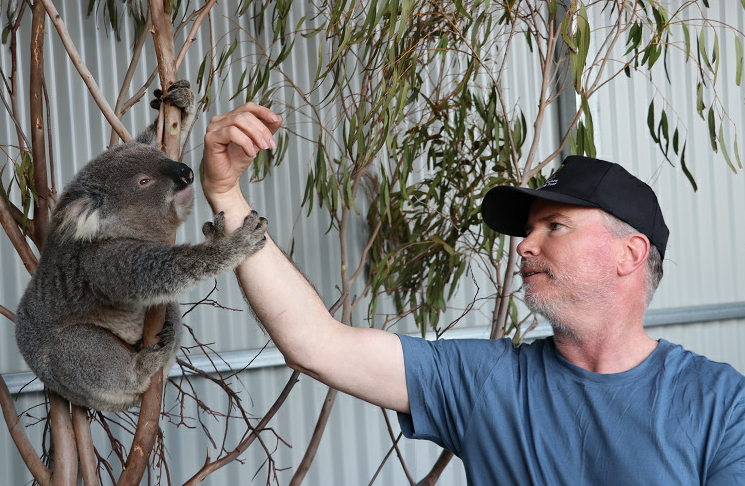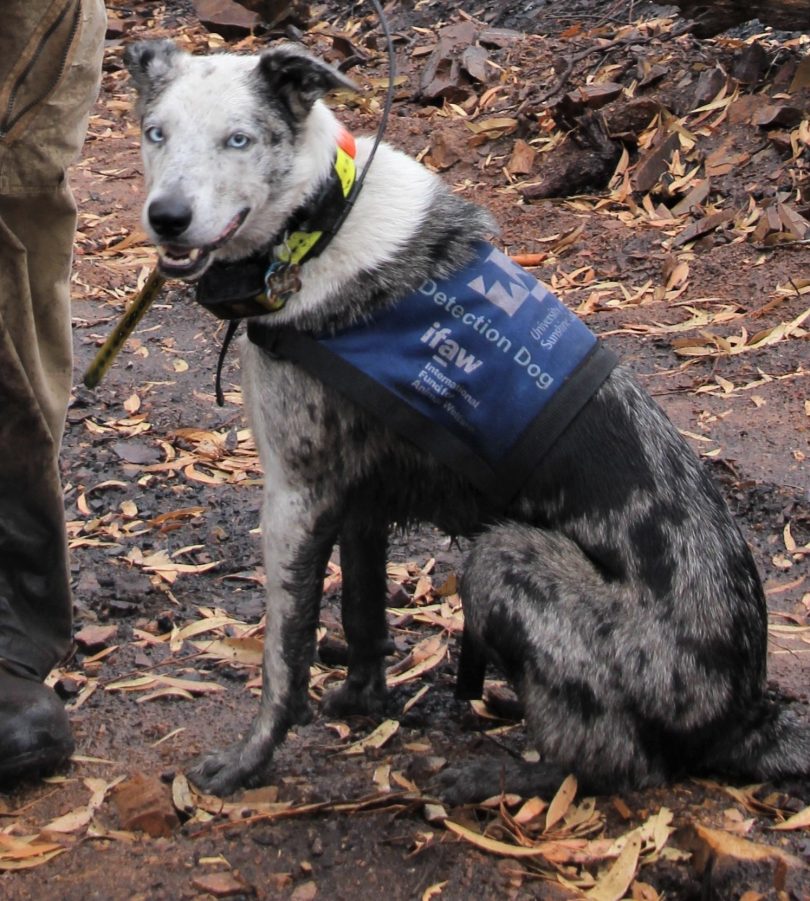
Paul the Koala and James Fitzgerald at the Two Thumbs Wildlife Trust sanctuary at Peak View. Photo: Supplied.
Two Thumbs Wildlife Trust’s James Fitzgerald has received a $5000 grant from the Snowy Monaro Regional Council’s Disaster Recovery Funding program to help rebuild his animal sanctuary after it was destroyed in the past summer’s bushfires.
Mr Fitzgerald lost his home and 16 years of work when the Good Good bushfire destroyed the Two Thumbs Wildlife Trust’s sanctuary at Peak View.
Under the Disaster Recovery Funding program, $20,000 has been made available to help wildlife carers across the Snowy Monaro region.
Snowy Monaro Regional Council Mayor Peter Beer, Deputy Mayor Lynley Miners, the local bushfire recovery team and volunteers involved in the region’s bushfire recovery presented Mr Fitzgerald with his grant.
“This grant is a great contribution and it will help us with rehabilitating the koalas,” said Mr Fitzgerald.
In the months since the bushfires, he has been working alongside a dedicated team to rescue injured koalas and rebuild his sanctuary.
“On 23 January, the fire totally destroyed my sanctuary and burnt down my house and shed,” he said. “I sort of lost everything. There was a lot of work to be done and a lot of koalas and animals that needed rescuing.”
One of the koalas being cared for at the sanctuary is Paul, named in honour of First Officer Paul Hudson who died when a Hercules C-130 air tanker crashed after dropping fire retardant on Mr Fitzgerald’s property.
James has also named two rescued koalas in recognition of firefighters Captain Ian McBeth and Flight Engineer Rick DeMorgan, who were also killed in the crash.
“It is a terrible tragedy,” said Mr Fitzgerald. “I’ve met the families of the pilots and they have met these koalas.
“Paul [the koala] had second-degree burns and, for a while, it looked like he might not make it. He is one of the success stories; some good to come out of what is otherwise a terrible tragedy.”
Two Thumbs Wildlife Trust has received support from the University of the Sunshine Coast, which sent its animal detection dog, Bear, to help locate injured koalas in the area surrounding the Peak View property.

Animal detection dog Bear is helping to find injured koalas. Photo: University of the Sunshine Coast.
Bear is part of the university’s dogs for conservation program and is highly trained to find koala fur.
“Bear is truly amazing,” said Mr Fitzgerald. “He picks up on the wind and finds where the koala is and sits under the tree it’s in. Bear has really helped us find those koalas who needed help.”
The rescued koalas are cared for in three new animal enclosures at the sanctuary. Mr Fitzgerald has used most of his own funds to build the enclosures. With two more planned, the rebuild will cost around $300,000.
He and the Australian National University have worked closely over the years and since the bushfires. Researchers have been studying how rehabilitated koalas released into the wild are integrating back into the resident koala population.
“We want to know how those resident koalas are using the burnt landscape,” said ANU researcher Dr Karen Ford. “Are they relying on the little patches of intact areas that weren’t burnt, or are they happy to move through the burnt areas.
“This research is important to tell us how we should respond to fires in the future. Do we need to support koalas through the early times after fires when there is little regrowth available, or can they survive quite happily on what’s not burnt.”







